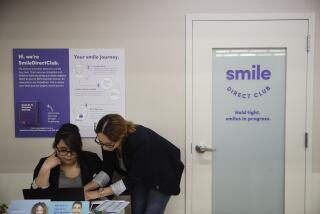Filling the Holes in the Dentist’s Soul
- Share via
KEY BISCAYNE, Fla. — Many feel unloved. Some would rather perform a root canal on themselves than hear one more down-in-the-mouth joke. Incomes may be high, but so too are the suicide rates.
Dentists, says Richard A. Green, are sensitive, hard-working and skilled at their craft. They relieve pain. But sometimes even their patients don’t like them.
“As a group, dentists are introverts, technicians with underdeveloped people skills,” said Green, a dentist who has interviewed more than 600 colleagues over the last seven years. “They often don’t know how to cope.”
So the American Dental Assn. has set up a host of well-being programs for its members. Motivational guru Tony Robbins runs workshops designed expressly for medical professionals. And around the United States, several privately run clinics have sprung up, not to mend cracked crowns or broken dentures but to repair the dentists themselves.
“I’ve been here 10 times in the last three years,” solo practitioner George Warga, 40, of Winnetka, Ill., said in between classes at the Pankey Institute on this island suburb of Miami. “The visits have kept me in practice.”
No one knows how many of the estimated 200,000 dentists in the country are profoundly unhappy. But over the years, various surveys have indicated that the rates of suicide, drug and alcohol addiction and job burnout are higher than those of comparable professions.
“Compared to physicians, we are much more isolated,” said periodontist David K. Okano of Rock Springs, Wyo., who chairs the ADA’s dentist well-being advisory committee.
Warga said he hit the wall just three years out of dental school. He was seeing more than 20 patients a day, managing a staff of 10 and making plenty of money doing the routine procedures dentists call “drill and fill.”
“But I wasn’t satisfied,” he said. “I was bored. I felt like I was running a convenience center, and all I heard [were] complaints.”
In weeklong stays at the Pankey Institute, 1,200 dentists this year will take postgraduate-level courses in an array of subjects, from orthodontics to occlusions. But embedded in all the technical information is what Green, director of business systems, calls the Pankey philosophy, which teaches dentists to regain a balance in their lives between work and spirituality.
Based on writings of L.D. Pankey, a Miami dentist who died in 1989, the philosophy combines a long-term commitment to patients with the need for dentists to reconnect with family and community.
It has worked for Warga. “They painted a vision for me: how I could love my work, feel appreciated and not feel the stress,” he said.
When he made his first visit to the Pankey Institute, said 45-year-old Tom Piccolo of Scottsdale, Ariz., “I was burned out to the point where I couldn’t think of what else to do.”
Piccolo said he thought the courses would teach him to work faster, so he could see even more than his average of 22 patients a day. Instead, after six visits, he said, “I sometimes see two patients a day, for up to three hours each. And we’re all happier.”
Other institutions that offer training and psychic rehabilitation for dentists are in Seattle, Las Vegas and St. Petersburg, Fla. The average five-day course at the Pankey Institute costs $3,200, plus lodging in a nearby condominium.
Figuring in lost work, Warga says, each week away costs him about $18,000. But the price is right, he said.
“At age 28, I was going to leave dentistry,” Warga said. “But now I’m enjoying myself. I will practice as long as I can.”
Times researcher Anna M. Virtue contributed to this story.
More to Read
Sign up for Essential California
The most important California stories and recommendations in your inbox every morning.
You may occasionally receive promotional content from the Los Angeles Times.













